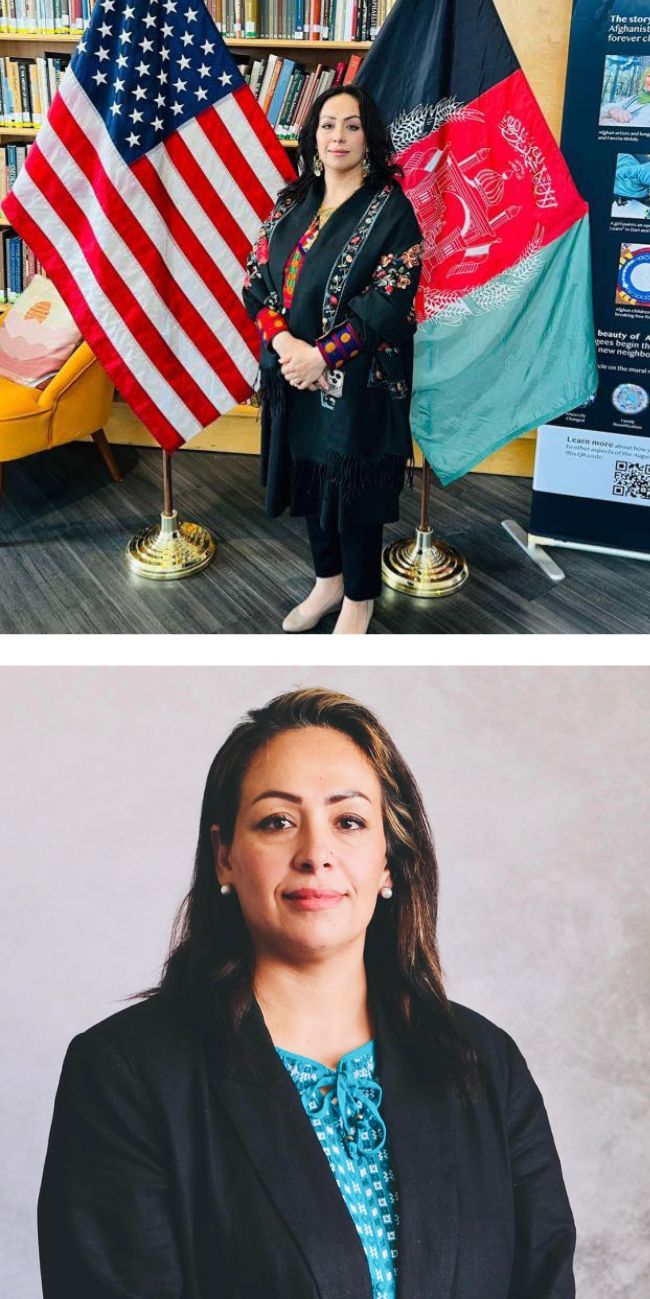Stories of Change

Top and Bottom: Najia
Five Minutes to Leave Everything Behind: Najia’s Journey from Kabul to Community Leader
When the Taliban took control of Kabul in 2021, Najia had just minutes to decide to leave her home, unsure if she would ever return. Now in the United States, she leads efforts to support thousands of Afghan newcomers—proving that refugees bring immeasurable value, resilience and leadership to their new communities.
Imagine if your entire life changed within the span of five minutes. That, in an instant, you had to prepare to leave your home behind, unsure if you would ever return. For Najia, those five minutes came in the form of a phone call on August 17, 2021—just two days after the Taliban had taken control of Kabul.
Due to her job, which supported the U.S. mission in Afghanistan, Najia knew she and her family were a target, and their home—the country where she was married and had three children, the place where her family, friends and loved ones lived—was no longer safe.
With only $300 in her pocket and the clothes she was wearing, Najia, her husband and their children boarded a plane to leave their home behind. Over the course of five flights across four different countries, they arrived at a military base in Indiana, alongside thousands of other Afghan newcomers, forced to face the same reality that they could not return home.
Before Kabul Fell: Life in Afghanistan
Like all refugees, Najia did not want to leave her home behind. Before Kabul fell, life in Afghanistan was filled with the warmth of loved ones and hope for a better future. “It was a golden period,” Najia shared. “I could enjoy the liberty of living in my homeland with my family and my relatives. I could see how my country was rebuilt; it was progressing, and I could see a lot of improvements—most importantly, as an Afghan woman.”
Those decades of progress seemingly washed away overnight. “Afghanistan was our home, our homeland. All of a sudden, it was occupied by the Taliban, and human rights were being taken away from children. Women are now forbidden from going to school.”
“We were forced to leave because we risked our lives day and night to support the U.S. government,” she shared. “We made a lot of sacrifices. Now, we seek the same support from the U.S. government to protect its Afghan allies.”
From Newcomer to Community Leader
Despite the heartbreak of leaving her homeland, Najia’s own difficult journey fueled her determination to help others facing the same challenges. Knowing firsthand how overwhelming it can be to start over in a foreign country, she was eager to support her neighbors from the moment she arrived in the United States. During her first three months, while living with her family on a U.S. military base, Najia stepped into action—volunteering to assist operations that served more than 7,000 newly arrived Afghans at Camp Atterbury in Indiana.
“I was a building leader for 280 women and children, working every day until midnight. [The military] was appointing leaders in the community to provide translation support and help newcomers access food, English classes and other activities. It was a privilege for me to help my own people, who came with nothing and were now living in a new environment.”
Her service didn’t stop there. After being resettled through a local resettlement agency, Najia stayed connected with many Afghan community members seeking services. When she realized there was no local organization dedicated to answering their questions, she decided to create one—the Afghan American Community Center (AACC)— alongside friends already working in the nonprofit sector.
Building a Community of Welcome and Support
Najia now works with a strong community of volunteers, all supporting Afghan newcomers who are able to arrive in the United States with Special Immigrant Visas (SIVs). She encourages U.S. citizens to volunteer in their local communities or advocate on behalf of their immigrant and refugee neighbors.
“There’s a strong call to action for our American friends and community members to advocate for family reunification and the resumption of the United States Refugee Admissions Program,” said Najia, who is now working to reunite with her mother—left in limbo in Afghanistan after being approved for departure, only to have her booked flight to the United States abruptly canceled.
Over the years, Najia’s leadership has only grown. Today, she serves as an acting leader at a local nonprofit that supports more than 2,000 Afghan community members with access to education, healthcare, civic engagement, legal services and basic needs. She also works as the Director of Refugee Resettlement with Patchwork Indy overseeing the Sponsor Circle program—a private sponsorship program that resettles Afghan SIV holders in the United States. through community sponsorship—and sits on the boards of several other organizations, partnering with groups like CWS to help Afghan newcomers create safe and stable new homes.
Looking back on the past four years, Najia hopes her journey serves as a reminder that building welcoming communities is essential—and that those forced to start over in a new country can, and often do, achieve extraordinary things that strengthen the places they now call home.
“I believe Afghan refugees are not a burden on the community. Refugees and immigrants come here with so many skillsets and give back so much to the United States. Doctors, engineers and so many others come here with valuable skills. They run restaurants, open stores and bring diversity. People are contributing to the workforce, the economy and the culture of this country. Now, the United States needs to uphold its promise and give back to its Afghan allies who have sacrificed greatly.”
Take action now to make a difference for those who need it most and ensure we live up to our promise as a nation.CWS also operates a local resettlement office in Indianapolis, Indiana, which you can learn more about here.
